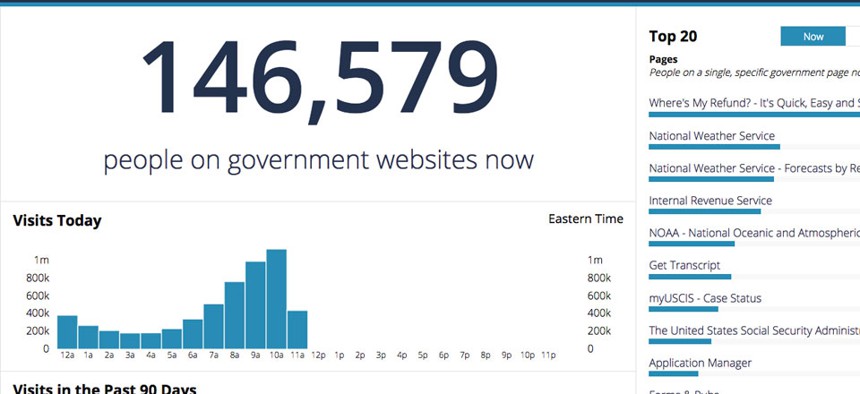New Dashboard Tracks Which Federal Sites You're On, And How You Got There

Analytics.usa.gov
The U.S. Digital Service, 18F and GSA's Digital Analytics team launched the site Thursday.
At 11:23 a.m. on Thursday, 150,980 people -- more than the population of Alexandria, Virginia -- were browsing U.S. federal websites. Five thousand of them visited an IRS.gov page called "Where's my Refund?" Another 2,091 were checking forecasts on Weather.gov.
These stats come from a new dashboard tracking user behavior on federal websites -- what they're looking at, what device they use, as well as their browser and operating system. The White House's U.S. Digital Service, along with two General Services Administration's tech teams, 18F and the Digital Analytics Program, launched the site Thursday.
Created over the course of two to three weeks, the site debuted during Sunshine Week, a national effort dedicated to government transparency.
The data could help federal digital service teams focus on the "services that matter most to the American people" by helping government agencies "understand how people find, access and use government services online," a White House blog post announcing the site said.
The real-time data is gathered by a Google Analytics account for federal digital services, and the blog post noted the program doesn't track individuals and anonymizes the IP addresses of visitors.
For now, the system covers less than 300 executive branch domains, out of 1,350 domains in total. (Government groups interested in adding their site are asked to email the Digital Analytics Program.)
So far, the White House team has learned that more traffic comes from phones and tablets, according to the blog post. A third of traffic in the past 90 days was from phones and tablets. Over the same period one year ago, it was closer to a quarter.
"Every year, building digital services that work well on small screens becomes more important," the White House blog post noted.
And the surge in traffic to IRS sites during tax season -- more than tripling traffic from the previous quarter -- suggests digital services should be flexible, "so that we can scale our web hosting to support surges in traffic as well as save money when our sites are less busy."
Code for the site and the code behind the data collection are on GitHub.
NEXT STORY: USAID Tech Guru VanRoekel Stepping Down





